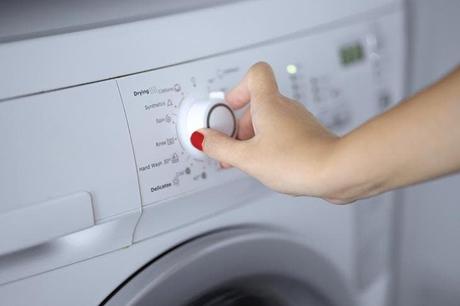We all want to get a perfect result after every wash of clothes. However, some washing machine programs use twice as much electricity, which makes our energy bills on the washing machine station double. Find out at what temperature you should machine wash your clothes to significantly reduce your energy consumption.
At what temperature should clothes be washed to save energy?
Washing clothes in the washing machine – Source: spm
Avoid washing your clothes at 40°C
The consumption of the washing machine can double by choosing a certain temperature. Many people think that choosing a washing program at 40 degrees Celsius is the secret to saving energy, but this is totally wrong. If you are used to washing your clothes at 40 degrees Celsius, you will have to give it up.
Washing at 30 degrees saves 40%
When you wash your laundry at a temperature of 30 degrees Celsius, the annual consumption of the washing machine is about 40% less than when washing at 40 degrees.
Read also: What temperature should the fridge be set to? This is the best temperature if you want to save money on your bills
Although the difference between 30 and 40 degrees does not seem very large, the difference of 10 degrees Celsius has a significant impact on electricity consumption. Heating the water 10 degrees higher means that the washing machine consumes about twice as much energy (A cycle at 40°C consumes about 0.7 kWh, while a cycle at 30°C consumes an average of 0. 4 kWh).

Adjust the washing machine – Source: spm
How to save 66% on your electricity bill?
You should also know that laundry will be just as clean and sanitized if washed at a lower temperature.
The latest technology machines allow your laundry to be washed efficiently at temperatures of up to 20 degrees Celsius, resulting in greater savings.
The setting of the washing machine at 90 degrees Celsius will only be carried out in the event of special hygienic needs.
Thus, washing at 20 degrees allows you to save up to 66% on your annual consumption compared to washing at 40 degrees Celsius.
For those who want to get a clean, germ-free laundry, it is recommended to air dry it.
Washing machines: other tips for saving money
It is important to reduce its energy consumption to save money and protect the environment. Washing machines are often one of the most energy-consuming appliances in a home. To avoid increasing your electricity bill, here are some tips to put in place:
Read also: When using air conditioning in the winter, you should watch out for these 2 things
- Wash your laundry during off-peak hours to benefit from the most advantageous rates.
- Fill the machine completely each time you use it to avoid wasting energy.
- Invest in an energy-efficient washing machine (rated A+ or A++) to reduce energy consumption.
- Use energy-efficient washing programs to avoid wasting water and electricity.
A dirty and unmaintained washing machine will cause the appearance of unpleasant odors, bacteria, mold and germs. You will realize this when you notice black stains on freshly washed clothes. However, you can easily prevent these inconveniences by using this inexpensive trick once a month.
You will need: 2 glasses of vinegar, 1/4 glass of baking soda, 1/4 glass of water, an abrasive sponge. Start by mixing the baking soda in a small bowl. It will act as a detergent to clean the washing machine. Next, pour the vinegar into a measuring cup. Put the mixture of water and baking soda in the detergent drawer of the washing machine, then pour in the vinegar. Finally, you can launch your usual machine program.
Read also: Heating the car in winter is a bad idea: this is why it should no longer be done
Via SPM

